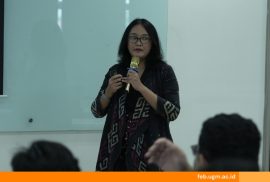Philosophy is the basis for the development of accounting and business research as an effort to understand reality through systematic, critical and radical thinking. Philosophy helps develop research and produce novelty as well as breakthrough by utilizing paradigms to be able to provide the best answers in practice. This was expressed by Heyvon Herdhayinta, S.E., M.Sc., Ph.D. as the speaker in the second series of webinars with the theme “Philosophy and Approaches to Accounting and Business Research” on Friday (16/04). This webinar series was organized by the Accounting Laboratory, Department of Accounting, FEB UGM together with the Master of Science and Doctoral Study Program (MD) FEB UGM and in this second series focused on further examining the paradigm of positivism and neo-positivism.
The event was opened by the Master of Ceremony (MC), Meliani Mukti, and then introducing the moderator as the guide for the discussion session, Achmad Masyhadul Amin, S.E., M.Sc. The event continued to the core session which was an explanation of the positivism paradigm by the speaker. Positivism is considered to be the mainstream and dominant paradigm because it is most widely used in accounting and business research. “The main characteristics of this paradigm are independent reality and objectivity. This means that the researcher sees what he is researching apart from the researcher as an objective reality,” said Heyvon.
In addition, there are several other characteristics of the positivism paradigm that Heyvon described. The positivism paradigm tends to resemble or adopt a natural science approach and is also able to explain a phenomenon of the regularity of human social behavior universally and causally. When compared with neo-positivism, also known as post-positivism, both still adhere to objective reality. However, the difference is that neo-positivism has begun to consider the subjective interpretation of actors to better understand human behavior, for example by considering the context or culture.
Furthermore, Heyvon also explained about positivism research methods and the implications of this paradigm on research. Positivist research designs generally use quantitative research methodologies with secondary data, experiments, or surveys. There are about eight points of positivism implications on research, among which the analyzed data can be tested whether it supports the hypothesis (testability) and prefers simple solutions in research rather than complex ones with many factors (parsimony).
According to Heyvon, the limitations and criticisms of positivism also need to be considered by researchers in conducting their research. The positivism paradigm usually only observes the visible “surface” without understanding the deeper meaning. The purpose of this paradigm is to achieve generalization where in fact there are things such as human behavior that cannot be generalized and there will still be an element of subjectivity.
Reportage: Kirana Lalita Pristy/Sony Budiarso.




